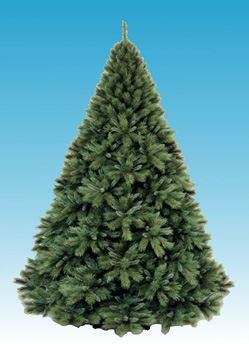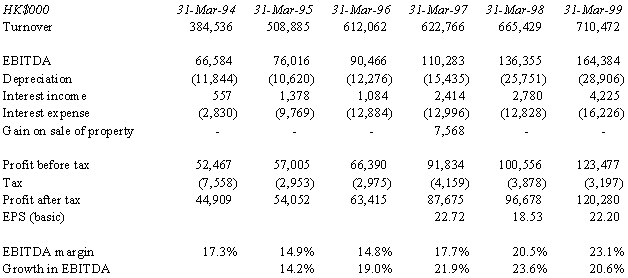Deck the Halls with Boto
5 December 1999

With only 19 shopping days left before Christmas (in Hong Kong, every day is a shopping day) we're beginning to get festive here at Webb-site.com.
It's not often we have anything positive to say about Hong Kong stocks - regular readers will know us as critics of corporate governance and we do our best to bring the worst examples to your attention. But this is the season of goodwill, so we thought it would be nice to say something positive for a change.
If you don't know what to get the one you love for Christmas, then why not give her or him a few shares in Boto International Holdings (stock code: 585). This small company makes a large share of all the plastic (sorry, artificial) Christmas trees sold in America. There's a rather fine example on the right. Boto is highly "vertically integrated", which means that its raw materials come in very basic forms, particularly polymers and metal. It makes its own PVC rigid film, which is then cut up and eventually becomes the leaves on the trees.
Last year 78% of Boto's turnover was from Christmas trees and about 20% from other festive decorations. Just over 2% of turnover came from the new product line of garden furniture. Using much of the same skills and materials, the group is making a logical move to reduce the seasonality of its business by using the slack winter months to make garden furniture, while the months of April to September (particularly Jul-Sep) are the main shipping months for Christmas trees. This should add to profitability in the long run. Sales of furniture in the year to 31-Mar-99 were only HK$16.3m, but that is expected to increase as they get past the pilot stage.
Last year 74% of sales were to North America and 22% were to Europe, so they have expansion potential there. Asia-Pacific accounted for just 3.3%.
Flotation
Boto, founded in 1983, was floated on the Hong Kong Stock Exchange on 10-Mar-97 with an offer price of $1.28 per share, issuing 125.4m shares to raise $160.5m gross ($145m net). The new issue represented 25% of the share capital, the minimum allowed.
Prior to going public, in the three years and seven months of the track record they paid out dividends of $20m, $40m, $45m and $35m respectively. The total of $140m represents in aggregate about 55% of the profits for the period, not excessive.
Track record
Turnover and profits have increased every year of the 6-year track record. EBITDA (earnings before interest, tax, depreciation and amortisation) has been increasing at a rate of more than 20% per annum for the last 3 years:

By the annual report on 14-Jul-99, the group claimed sales orders for the current year to 31-Mar-00 amounted to HK$665m. Gearing is relatively low. Debt net of cash at 31-Mar-99 was about $46m or about 10% of shareholders' funds of $465m (about $0.86 per share). We have excluded $53.4m of convertible notes (including accrued interest) from the debt figure (see below). The group probably has swings in its working capital position due to the seasonality of the business.
The depreciation charge has been rising due to the recent investments in plant and machinery to increase vertical integration as well as the factory for the furniture business. That should be money well spent. The EBITDA margin has increased partly because the group now makes all its own PVC films (which end up as leaves on the trees).
Corporate Governance
In its first 2 years as a listed company, Boto has behaved well. Accounts have been out on time, and the company has not indulged in property or stock market speculation, nor has it tried to "dot-com" itself. Indeed, it seems very focused on its core businesses. All the subsidiaries are wholly-owned, so there are no difficult PRC joint venture parties to deal with. There are no associate companies, and Boto's only equity investment is a 10% holding in Bo Cheong Manufacturing Company Ltd, an unlisted company which makes Christmas tree accessories. This investment is held in the books at a carrying value of just HK$10,000.
The independent non-executive directors are Mr Alexander Reid Hamilton, a former partner of Price Waterhouse, and Mr Oh Kok Chi, who is also an accountant.
Issue to SIIC
On 13-Sep-97, which was the first possible day after the 6-month lock-up following the flotation, Boto agreed to issue 40,128,000 new shares at $1.53 per share to Shanghai Industrial Investment (Holdings) Company Ltd (SIIC), which is the private Hong Kong window company of the Shanghai Government and also controls Shanghai Industrial Holdings. The placing raised $61.4m gross ($60m net).
In retrospect the issue was good timing as it was settled on 30-Sep-97, days before the stock market crashed. The deal was managed by Seapower Corporate Finance, who had also sponsored the flotation. The shares then represented 7.4% of the enlarged issued share capital. As this is below the disclosure threshold we don't know whether SIIC still holds the stock. However, SIIC director Mr Zhuo Fu Min is still on the Boto board which would normally indicate that the shareholding remains. The stated motive at the time was to develop the PRC market, but sales there have been flat recently.
Share Options
Under Boto's share option scheme, on 3-Nov-97 (just after the market crash) Boto issued 27.3m share options (equivalent to about 5% of the issued shares) exercisable at $0.7936 per share between 7-May-98 and 6-May-00. Of these, 21.5m options were issued to directors. As the share price continued to fall, during the year ended 31-Mar-99 Boto granted a further 11.3m options exercisable at $0.4688 per share between 24-Apr-99 and 23-Apr-01. Of these, 7.2m went to directors. Exercise of all the options would raise $27.0m gross.
Bonus Warrants
Following approval at a Special General Meeting on 23-Jan-98, Boto issued 1 warrant for every 10 shares held. The warrants are exercisable between 4-Feb-98 and 3-Feb-00 at $1.05 per share. At the time of writing, they therefore have 2 months left to run and are almost "at-the-money" with the share price of $1.03. If they are exercised, the company will receive about $56.9m gross.
Issue of Convertible Notes to Walden
On 5-May-98, Boto agreed to issue US$6.5m (HK$50.6m) of convertible notes to 3 funds managed by Walden International Investment Group (WIIG). Net proceeds were US$6.3m (HK$48.8m), of which about US$3m was to be used for the construction of a new factory complex for outdoor furniture (next to the existing factory in Shenzhen) and the rest to repay bank borrowings and for working capital.
WIIG's founder and Chairman, Mr Tan Lip-Bu, has a master's degree in nuclear engineering from MIT, an MBA from the University of San Francisco and has joined the board of Boto as a non-executive director.
The notes are convertible into new shares at US$0.129 each (or about HK$1.00) which represents a 14.6% premium to the average market price for 10 days prior to the agreement. The coupon is 3% per annum and maturity is 1-May-01. If the notes are not converted, then the note holders are guaranteed a "yield to put" of 12% per annum. That means Boto would have to redeem them at a premium to their nominal value so that the interest rate plus the premium gives the holder an effective 12% annual return.
As Boto is still trading close to the conversion price, it has been providing for the potential cost of the put premium in its results. This provision would be reversed if the notes are subsequently converted.
Market rating
The current share price of $1.03 puts the company on a P/E of just 4.6x its basic EPS for the year-ended 31-Mar-99, or 4.8x fully-diluted EPS. Results for the first half of this year (which, due to seasonality, is the most profitable half) are due to be released before Christmas. Last year Boto paid dividends of 11 cents (including a special dividend of 2.2 cents) putting it on a historic yield of 10.7%.
There are undoubtedly challenges in broadening its business to outdoor furniture, but this should be well within their capability. The recent increase in oil price will also affect their polymer raw material costs if it holds up to next year, but as this affects all manufacturers in the sector, it will probably get passed on to the customers. Boto is estimated to have a 40-45% share of the US artificial tree market so it is in a strong position.
In Hong Kong, over 550 small companies like Boto make up just 10% of the market by value, while the largest 100 companies make up 90% of the market value. So small-caps are under-researched and the good ones often get overlooked amongst all the rubbish in the sector, until someone picks them up and shines a light on them.
We think Boto deserves a chance. Why not put a few under the Christmas tree?
© Webb-site.com, 1999
Organisations in this story
Topics in this story
Sign up for our free newsletter
Recommend Webb-site to a friend
Copyright & disclaimer, Privacy policy


